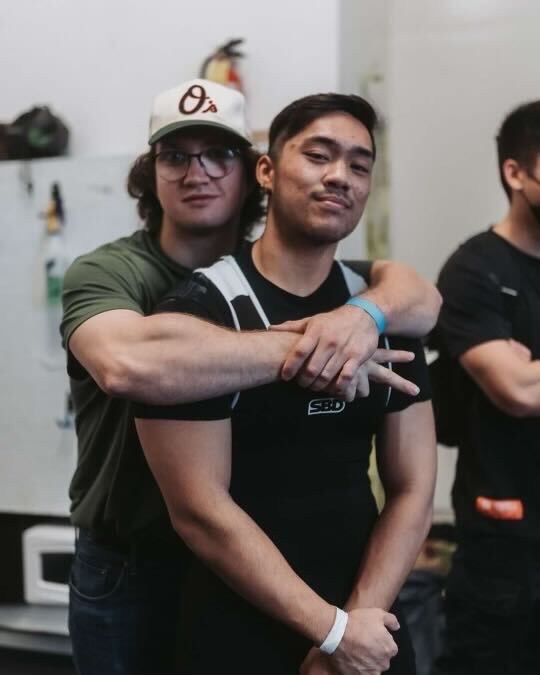Club members discuss resources, culture and stigmas in powerlifting
By REBEKA ZELJKO — features@theaggie.org
Everyone’s journey to powerlifting looks different. But for many at UC Davis, the community that Aggie Barbell has created seems to be a common thread.
Aggie Barbell is a student-led powerlifting club that was established in 2014. “Aggie Barbell Club has something to offer for everyone, no matter your experience level,” according to their website.
“For those who treat lifting as a lifestyle and have years of experience, we offer the opportunity to add another dimension to your training,” the website reads. “For those who are new to lifting and don’t know where to start, we offer workshops to guide you along your fitness journey.”
Trent Hurtado, a fourth-year political science major and student coach, started powerlifting during his time at UC Davis.
“I got into lifting about two years ago, but I usually like lifting by myself,” Hurtado said. “I’m really stubborn and close-minded with my schedule, but Aggie Barbell is a good way to kind of break away from that and get more involved with my friends.”
Hurtado said the club offers a sense of support in a sport that can be intimidating to many people.
“It was a cool opportunity to combine the social aspects with my hobby,” Hurtado said. “And [it] will cheer you along and offer you moral support, be a bit of a rock.”
An experience shared by many gym-goers is the initial difficulty of getting involved in the sport. Erica Chau, a third-year cognitive science major, said that her feelings of intimidation were reduced by joining Aggie Barbell.
“My interest in powerlifting happened around my first year when I started going to the gym,” Chau said. “I always wanted to power lift, but I was very intimidated and inconsistent with going to the gym. But once I began to learn more about the sport, I became more committed when I made friends with people at the ARC and from Aggie Barbell.”
Chau said the community created by Aggie Barbell encouraged her to pursue her interest in powerlifting and also gave her a support system.
“I met the members at the ARC and befriended them one by one, and they said that I’m basically in the club,” Chau said. “I’m glad I’m a part of the club because it allowed me to be more serious about the sport while having fun with my friends.”
Alli Ngo, a third-year biological sciences major, said that her involvement with the club has contributed to her progress in her social life and self-confidence.
“Before joining, I basically only talked to my roommates, but now I have this whole group of friends,” Ngo said. “When I first started lifting, I was super intimidated. I would go at hours when it was super crowded, and I was worried people would be staring at me or judging me. But people really just mind their own business. Like when I go, I look at other people not because I’m judging, but I’m admiring them. I’m like, ‘Wow, she is really strong.’”
Hurtado said the intimidation at the gym is normal and more common than many people think.
“When you go to the ARC and see massive dudes in cut-off tank tops, it’s easy to understand why people are nervous to go to the gym,” Hurtado said. “But in reality, a lot of people luck their way in. Not to diminish any of their hard work, but nobody is as sure of what they are doing, and they all lack a bit of confidence, and that’s okay.”
Ngo gave some advice for people who want to get into lifting but are intimidated by the gym.
“Make your routine at home, so you know what you’re going to do at the gym,” Ngo said. “There’s a lot of great resources online, and even here. Aggie Barbell does a lot of beginner-friendly workshops for people who are interested in learning about lifting.”
Hurtado said joining a powerlifting community like Aggie Barbell provided him with new ways to track improvement in his performance.
“It is also a little fun to get competitive with it,” Hurtado said. “As much as they say to focus on yourself, it is fun to be like, ‘I’m catching up with that guy.’ It’s just fun to move forward because the progress is pretty objective.”
In powerlifting, progress can be seen pretty objectively by increasing weight or repetitions of a certain movement. But Hurtado stressed that though seeing progress is exciting, it is important to remember that is not linear.
“Over the summer, I squatted 500 just for a single, and there was a bit of an accident because the bar slid down my back, and it put a lot of pressure on my left hip,” Hurtado said. “After that, I could hardly squat like 10% of my squat for the rest of the summer. It took a long time to get over, but now I’m doing [500] for sets of eight, so it’s cool to think you don’t stay in one place forever.”
Making progress, no matter how big or small, also often translates into confidence, according to Chau.
“Powerlifting has positively impacted my life because it helped me build confidence in myself and my strength by seeing how much progress I’ve made since when I first started,” Chau said. “Powerlifting requires a lot of time and dedication, and it’s very gratifying to see myself stick with it so far.”
For Ngo and many fellow powerlifters, lifting has changed their lives for the better.
“To me, powerlifting makes me realize how strong I really am,” Ngo said. “It’s really turned my life onto a different path.”
Written by: Rebeka Zeljko — features@theaggie.org




